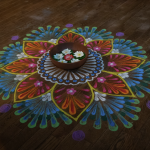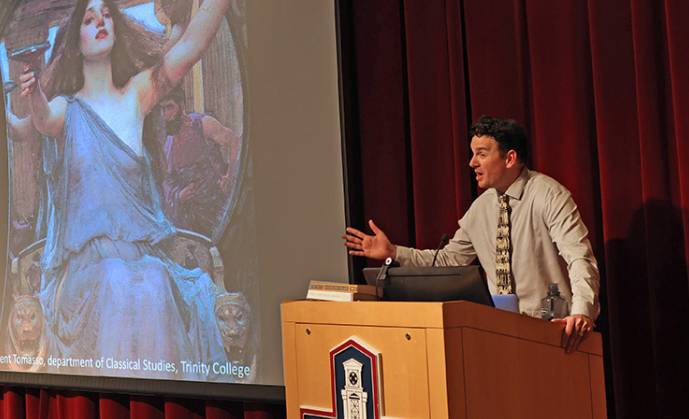Lily Mellitz ’26
Features Editor
In a world often consumed by the latest trends and technologies, the study of Classics offers a refreshing perspective firmly rooted in the ancient past. The Tripod had the privilege of interviewing Professor Vincent Tomasso, a scholar of classical studies at Trinity College.
Professor Tomasso’s journey into the world of Classics began at a young age, ignited by his mother, a librarian, who introduced him to mythology through books. His interest was piqued further in middle school when his teacher, using tape recordings, would turn off the lights and lead them under their desks to experience the “Odyssey.” This experience, which he fondly remembers as a “magical time,” served as the foundation for his enduring love of the classics.
Tomasso completed his undergraduate studies at the University of Washington in Seattle. Initially drawn to archeology, his academic path shifted to a field that truly captivated his academic curiosity: Classics. After college, Tomasso pursued a Ph.D. before becoming a professor at Trinity. Reflecting on his decision to join Trinity, Tomasso expressed his inclination towards the academic path and mentioned that Trinity happened to have an opening at the opportune moment.
At Trinity, one of Professor Tomasso’s most popular courses, “Mythology,” delves into the significance of Greek mythology and its relationship to literature and art. Tomasso also teaches Latin 101 and Greek 101 and serves as a thesis advisor. Beyond the classroom, Tomasso is writing an article about the movie “Die Hard,” particularly focusing on the mention of Alexander the Great by the villain as part of his exploration of the depth of knowledge about Greek myths in popular culture. Furthermore, he is working on a book about Roman Greek epics, which were written in Greek during the Roman Empire’s reign from the 1st century A.D. to the 5th century A.D. These epics were written under Roman control but in the Greek language, representing a fascinating cross-cultural phenomenon of that era.
Professor Tomasso delved into the discussion of Classics, illuminating how the Ancient Greeks offered us a symbolic framework for understanding the complexities of human nature in a post-Classical age, particularly through the lens of duality. He illustrated this with the example of how the Ancient Greeks depicted their gods with dualities, such as the war gods embodying both Mētis (cunning intelligence) and Biē (physical power).
Professor Tomasso drew a thought-provoking parallel with the concept of money, emphasizing, “Money can be good and money can be bad, depending on how you use it.” This comparison underscores how Ancient Greek mythology offers a symbolic narrative for understanding the complexities and contradictions of human nature.
“It seems contradictory, but the Greeks embraced such contradictions in their myth[s],” Tomasso remarked, noting the progressive thinking of these ancient civilizations in representing such dualities in their deities.
Next, Tomasso underscored the significance behind the field’s name, Classics, pointing out that the past continuously imparts important lessons. He mentioned the lasting relevance of myths such as Athena and Arachne, a cautionary tale about mortal Arachne, who claimed superiority in weaving skills over the goddess of weaving herself, Athena. As punishment, Arachne is transformed into the first spider, and her tale imparts lessons on humility and the perils of excessive pride. Tomasso encouraged individuals to draw personal meaning from such a myth and apply it to their lives.
Tomasso also commented on how myths provide a window into the values and beliefs of past societies while cautioning against interpreting these ancient stories and references without considering their context. He used the myth of Pandora as an example, where the first mortal, entrusted with a jar she was told never to open, succumbed to curiosity and unleashed all the evils and miseries into the world.
“Pandora’s myth,” he explained, “Reflects a 7th-century B.C. farmer’s perception of women’s roles, which might diverge from our perspectives today.” Nonetheless, Tomasso stressed the significance of understanding these myths within their cultural contexts to better comprehend the anthropology of that era.
When asked about his favorite myth, Tomasso responded with the myth of Circe from the “Odyssey.” Circe was a sorceress who transformed men into pigs.
“Circe’s character speaks to us now,” Tomasso noted, referencing author Madeline Miller’s reinterpretation of Circe’s myth where Circe is sexually assaulted. In Homer’s “Odyssey,” Circe is not depicted as a survivor of assault, but Miller portrays her as such, allowing her story to resonate with contemporary discussions about sexual assault. Additionally, Circe’s tale involves the reclamation of the word “witch,” aligning with the empowerment themes of the #MeToo movement.
Tomasso also touched upon the myth of Achilles from the Iliad, highlighting its relevance to modern understandings of sexuality. “Achilles speaks to modern-day sexuality,” Tomasso noted. In the original “Iliad,” Achilles is not overtly portrayed as homosexual. However, in “The Song of Achilles,” a retelling of the Trojan War myth by Madeline Miller, Achilles and Patroclus are depicted as lovers.
“Over time, even in Ancient Greece, the idea of their relationship changed,” Tomasso explained. “During the classical period of Greece, attitudes towards homosexuality became more accepting.” Previously, gay men were not openly acknowledged in society. However, perceptions changed, and relationships like that between Achilles and Patroclus began to be viewed more openly as romantic rather than just as close friendships or familial bonds.
Professor Tomasso’s passion for the Classics shines through in his teaching, research and discussions, bridging the gap between the ancient and modern worlds. His exploration of ancient myths not only enlightens his students but also encourages us to reflect on the timeless lessons embedded in these stories. As we navigate the complexities of the modern world, the wisdom of the ancients can serve as a guide, reminding us of our shared humanity and the enduring relevance of the lessons passed down through generations.
In the words of Professor Tomasso, “It’s important to understand the myths and where they’re coming from because [they are] the history of things that really happened.”





+ There are no comments
Add yours